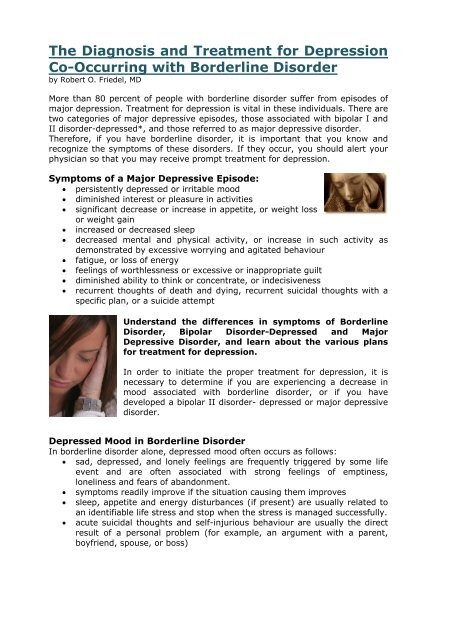personality disorders explained
Antisocial Personality Disorder, Codependence, Narcissism and Borderline
Antisocial Personality Disorder, Codependence, Narcissism and Borderline
Create successful ePaper yourself
Turn your PDF publications into a flip-book with our unique Google optimized e-Paper software.
The Diagnosis and Treatment for Depression<br />
Co-Occurring with Borderline Disorder<br />
by Robert O. Friedel, MD<br />
More than 80 percent of people with borderline disorder suffer from episodes of<br />
major depression. Treatment for depression is vital in these individuals. There are<br />
two categories of major depressive episodes, those associated with bipolar I and<br />
II disorder-depressed*, and those referred to as major depressive disorder.<br />
Therefore, if you have borderline disorder, it is important that you know and<br />
recognize the symptoms of these <strong>disorders</strong>. If they occur, you should alert your<br />
physician so that you may receive prompt treatment for depression.<br />
Symptoms of a Major Depressive Episode:<br />
persistently depressed or irritable mood<br />
diminished interest or pleasure in activities<br />
significant decrease or increase in appetite, or weight loss<br />
or weight gain<br />
increased or decreased sleep<br />
decreased mental and physical activity, or increase in such activity as<br />
demonstrated by excessive worrying and agitated behaviour<br />
fatigue, or loss of energy<br />
feelings of worthlessness or excessive or inappropriate guilt<br />
diminished ability to think or concentrate, or indecisiveness<br />
recurrent thoughts of death and dying, recurrent suicidal thoughts with a<br />
specific plan, or a suicide attempt<br />
Understand the differences in symptoms of Borderline<br />
Disorder, Bipolar Disorder-Depressed and Major<br />
Depressive Disorder, and learn about the various plans<br />
for treatment for depression.<br />
In order to initiate the proper treatment for depression, it is<br />
necessary to determine if you are experiencing a decrease in<br />
mood associated with borderline disorder, or if you have<br />
developed a bipolar II disorder- depressed or major depressive<br />
disorder.<br />
Depressed Mood in Borderline Disorder<br />
In borderline disorder alone, depressed mood often occurs as follows:<br />
sad, depressed, and lonely feelings are frequently triggered by some life<br />
event and are often associated with strong feelings of emptiness,<br />
loneliness and fears of abandonment.<br />
symptoms readily improve if the situation causing them improves<br />
sleep, appetite and energy disturbances (if present) are usually related to<br />
an identifiable life stress and stop when the stress is managed successfully.<br />
acute suicidal thoughts and self-injurious behaviour are usually the direct<br />
result of a personal problem (for example, an argument with a parent,<br />
boyfriend, spouse, or boss)

















